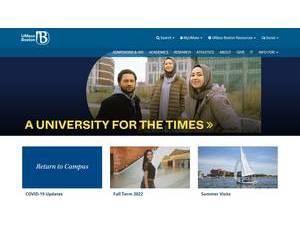
Overview
Established in 1964, the University of Massachusetts Boston is a non-profit public higher education institution located in the urban setting of the large city of Boston (population range of 500,000-1,000,000 inhabitants), Massachusetts. Officially accredited by the New England Commission of Higher Education, University of Massachusetts Boston (UMB) is a large-sized (uniRank enrollment range: 15,000-19,999 students) coeducational US higher education institution. University of Massachusetts Boston (UMB) offers courses and programs leading to officially recognized higher education degrees such as pre-bachelor's degrees (i.e. certificates, diplomas, associate or foundation), bachelor's degrees, master's degrees and doctorate degrees in several areas of study. See the uniRank degree levels and areas of study table below for further details. This 60-year-old US higher-education institution has a selective admission policy based on entrance examinations and students' past academic records and grades. The acceptance rate range is 70-79% making this US higher education organization a moderately selective institution. International applicants are eligible to apply for enrollment. UMB also provides several academic and non-academic facilities and services to students including a library, housing, sports facilities, financial aids and/or scholarships, study abroad and exchange programs, online courses and distance learning opportunities, as well as administrative services.
University Snapshot
Control
![]() public
public
Entity
![]() non-profit
non-profit
Size
![]() large-sized
large-sized
Selectivity
![]() moderately selective
moderately selective
University Identity
| Name | University of Massachusetts Boston |
|---|---|
| Acronym | UMB |
| Founded | 1964 Origins date back to 1852 |
| Colours | Blue and white |
| Mascot | The Beacon |
| Screenshot |

|
| Video Presentation |
n.a.; please submit an official University of Massachusetts Boston general video presentation. |
University Location
| Address | 100 Morrissey Boulevard Boston 02125-3393 Massachusetts United States |
|---|---|
| Location Map and Satellite View | |
| +1 (617) 287 5000 | |
| +1 (617) 287 5999 |





Social Media
Introduction
Social media can be a powerful tool for Universities to communicate with current students, alumni, faculty, staff and the wider community. But how can social media be important for prospective students? Read our article about the importance of Social Media for universities and prospective students to learn more.
Social Media
uniRank publishes brief reviews, rankings and metrics of some University of Massachusetts Boston's social media channels as a starting point for comparison and an additional selection tool for potential applicants.
University of Massachusetts Boston's Facebook page
University of Massachusetts Boston's X (formerly Twitter) page
University of Massachusetts Boston's YouTube channel
University of Massachusetts Boston's Instagram page
University of Massachusetts Boston's main LinkedIn profile
n.a.